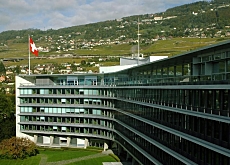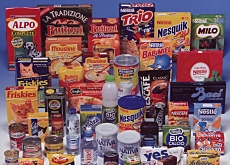Nestlé to axe 645 jobs in northern England

Swiss food giant Nestlé is to shed 645 jobs at its chocolate factory in York, northern England, as part of a major restructuring programme.
The world’s biggest food producer said on Wednesday that part of the old Rowntree York site would be sold off as it could not match the efficiency of its modern factories in Europe.
Nestlé said it hoped that half of the job losses would be achieved through voluntary redundancies or early retirement, and added that the move would help safeguard the long-term employment for over 1,800 staff at York.
The announcement follows an earlier cut of 234 jobs at the chocolate factory in March 2006.
Union officials have described the decision as a devastating blow and have vowed to fight the job losses.
Tough market
“The [domestic] confectionery market is very competitive. Our Nestlé Rowntree business has market-leading brands and strong potential, and this restructure and investment programme will ensure that it is fit for the future,” explained Alastair Sykes, Nestlé UK’s chief executive officer.
Nestlé’s move is part of the group’s £20 million (SFr47.2 million) investment to modernise part of the York site, but other outdated buildings not suitable for new production methods will be sold off.
The York factory is divided between state-of-the-art purpose-built manufacturing facilities and the original 19th century factory buildings.
“Our plans involve difficult but essential changes to secure the long-term future of the factory and to help safeguard long-term employment for over 1,800 of our employees in York,” Paul Grimwood, managing director of Nestlé Rowntree told the Yorkshire newspaper, The Northern Echo.
The company will be moving part of its production to Germany, Spain, the Czech Republic, and to other plants in Britain. The York factory will lose important brands including Smarties but retain the KitKat, Aero, Milky Bar, Polo and Yorkie product lines.
Nestle said in a statement that the changes would start in 2007 and continue through 2008.
Analysts said Nestlé, number three in the British confectionery market, has suffered recently with Cadbury Schweppes gaining ground until this summer’s salmonella scare while the US group Mars has also picked up share.
“Nestle has had a tough time over the last three to four years in the British confectionery market and has been losing market share,” David Lang, an industry analyst at Investec Securities, told Reuters.
swissinfo with agencies
Nestlé, the leading food business ahead of Unilever, Kraft and Danone, is among the biggest 30 companies in the world in terms of capital.
It employs around 250,000 people in five continents. In 2005 its sales totalled SFr91 billion and its net profit was SFr7.9 billion.
The giant is moving into the cosmetic and pharmaceutical industries, and now owns L’Oreal and a stake in US eye-care company, Alcon.
Nestlé employs around 7,000 people in Britain, spread over 13 sites. Last year Nestlé UK had sales totalling SFr4.4 billion (+3.6%).
Nestlé will transfer production of Smarties, Black Magic, Dairy Box, Drifter and Matchmakers chocolates from the York site, which will retain the KitKat, Aero, Milky Bar, Polo and Yorkie product lines.
First-half 2006 net profit: SFr4.15 billion (+ 11.4%)
Sales: SFr47.14 billion (+11%)
Operating profit (Ebita): SFr6 billion (14.5%)

In compliance with the JTI standards
More: SWI swissinfo.ch certified by the Journalism Trust Initiative











You can find an overview of ongoing debates with our journalists here . Please join us!
If you want to start a conversation about a topic raised in this article or want to report factual errors, email us at english@swissinfo.ch.